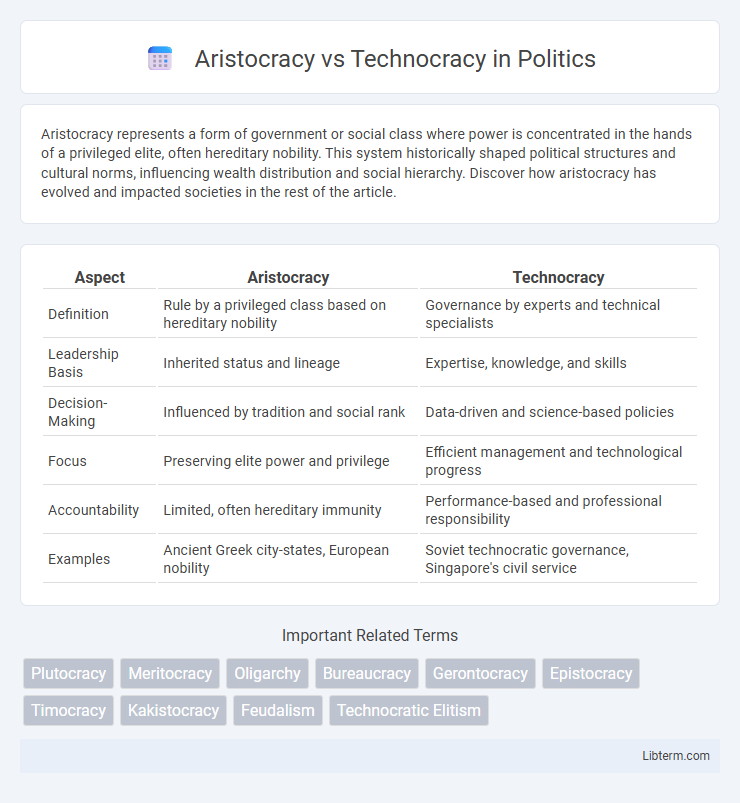Aristocracy represents a form of government or social class where power is concentrated in the hands of a privileged elite, often hereditary nobility. This system historically shaped political structures and cultural norms, influencing wealth distribution and social hierarchy. Discover how aristocracy has evolved and impacted societies in the rest of the article.
Table of Comparison
| Aspect | Aristocracy | Technocracy |
|---|---|---|
| Definition | Rule by a privileged class based on hereditary nobility | Governance by experts and technical specialists |
| Leadership Basis | Inherited status and lineage | Expertise, knowledge, and skills |
| Decision-Making | Influenced by tradition and social rank | Data-driven and science-based policies |
| Focus | Preserving elite power and privilege | Efficient management and technological progress |
| Accountability | Limited, often hereditary immunity | Performance-based and professional responsibility |
| Examples | Ancient Greek city-states, European nobility | Soviet technocratic governance, Singapore's civil service |
Defining Aristocracy: Power by Heritage
Aristocracy is a form of government where power is held by a privileged class or nobility, often determined by hereditary lineage and family ties. This system prioritizes social status, land ownership, and inherited privileges as the basis of authority, contrasting with merit-based governance models. The aristocratic elite traditionally influence political decisions, economy, and culture through inherited wealth and longstanding social structures.
Understanding Technocracy: Rule by Expertise
Technocracy is a system of governance where decision-making authority is vested in experts with specialized knowledge and technical expertise, rather than inherited privilege or political power. This model prioritizes data-driven policies and scientific methodologies to address social, economic, and technological challenges. Unlike aristocracy, which relies on hereditary status and traditional authority, technocracy emphasizes meritocratic leadership based on competence and empirical evidence.
Historical Origins of Aristocracy
Aristocracy originated in ancient Greece, where political power was held by a privileged class of noble families based on hereditary lineage and land ownership. This elite ruling class emphasized birthright and social status as the basis for governance, contrasting with merit-based systems. Over centuries, aristocracies influenced monarchies and feudal systems across Europe, shaping the political and social hierarchies of early civilizations.
The Rise of Technocratic Governance
Technocratic governance has emerged as a powerful alternative to aristocracy by prioritizing expertise, data-driven decision-making, and specialized knowledge in public administration. Unlike aristocratic rule, which is based on hereditary privilege and social status, technocracy emphasizes meritocracy and scientific management to address complex societal challenges efficiently. Governments worldwide increasingly adopt technocratic principles to enhance policy effectiveness, transparency, and innovation in sectors like healthcare, environmental regulation, and economic planning.
Key Principles: Authority, Merit, and Knowledge
Aristocracy bases authority on hereditary lineage and social status, prioritizing inherited privilege over individual achievement. Technocracy assigns power according to expertise and measurable merit, valuing specialized knowledge and technical skills as essential for governance. Knowledge in technocracy is empirically grounded and application-driven, whereas aristocracy relies more on tradition and historical precedence.
Social Mobility: Barriers and Bridges
Aristocracy often enforces rigid social hierarchies, limiting social mobility through inherited privilege and exclusive access to resources. Technocracy promotes meritocracy by valuing expertise and skills, potentially lowering barriers for social advancement based on knowledge and innovation. However, both systems can face challenges: aristocracy in preserving elite status, and technocracy in ensuring equal access to education and technology.
Decision-Making Processes in Each System
Aristocracy bases decision-making on inherited status and the wisdom of a select elite, often emphasizing tradition and lineage as sources of authority. Technocracy relies on experts and specialized knowledge, using data-driven analysis and scientific methods to guide policy and governance. The contrast lies in aristocracy valuing noble heritage for leadership legitimacy, while technocracy prioritizes technical competence and empirical evidence for effective decision-making.
Impact on Economic Development
Aristocracy often concentrates wealth and decision-making power in a hereditary elite, which can limit social mobility and slow innovation due to resistance to change. Technocracy leverages expertise and data-driven policies, promoting efficiency and fostering technological advancements critical for sustained economic growth. Economies governed by technocratic principles tend to experience higher rates of productivity, investment in research and development, and adaptive market strategies that drive long-term development.
Challenges and Criticisms of Both Models
Aristocracy faces criticism for perpetuating social inequality and limiting political power to a privileged elite, often disregarding merit and broader public interests. Technocracy encounters challenges due to its reliance on technical expertise, which may overlook ethical, cultural, and democratic values, potentially leading to technocratic authoritarianism. Both models struggle with legitimacy and inclusivity, raising concerns about accountability and the representation of diverse societal needs.
The Future: Can Aristocracy and Technocracy Coexist?
The future of governance may see a synthesis between aristocracy and technocracy, blending hereditary leadership with expertise-driven decision-making to optimize societal outcomes. This hybrid model leverages the stability and tradition of aristocratic institutions alongside the innovation and efficiency of technocratic governance, potentially fostering balanced policies that address both long-term cultural values and rapid technological advancements. Successful coexistence depends on adaptive frameworks that integrate meritocratic principles within established hierarchies, ensuring inclusive yet competent leadership structures.
Aristocracy Infographic

 libterm.com
libterm.com